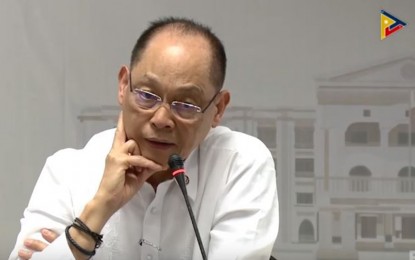
BSP Governor Benjamin Diokno (Photo courtesy of PTV)
MANILA -- The policy-making Monetary Board (MB) on Thursday kept the Bangko Sentral ng Pilipinas' (BSP) key policy rates unchanged after noting that inflation outlook remains broadly balanced and domestic growth is likely to stay firm.
The decision to hold steady for the moment was made after the Board slashed by 25 basis points the BSP’s key rates in its rate setting meet last May on account of the deceleration of inflation. Some economists were anticipating the MB to make a similar rate cut today.
To date, rate of the overnight reverse repurchase (RRP) facility is still at 4.5 percent, the overnight deposit facility rate is 4 percent and the lending facility is at 5 percent.
In a briefing Thursday, BSP Governor Benjamin Diokno said the Board still believes that inflation will remain within the government’s 2 to 4 percent target band this and next year.
He expressed rock-solid confidence on this even after an uptick to 3.2 percent last May from the previous month’s 3 percent. Average inflation in the first five months this year stood at 3.6 percent.
Diokno said the impact of weaker global economic prospects and its resulting effect on global demand along with increased trade concerns are expected to keep the inflation outlook at bay.
He, however, noted that possible impact of the El Niño is an upside risk to domestic rate of price increases.
Relatively, the central bank chief said that overall domestic economic activity remains firm amid the slide of output in the first quarter of the year.
Growth, as measured by gross domestic product (GPD), registered a 5.6 percent expansion from January to March this year, the slowest in the last 16 quarters after a 5.1 percent output in the first quarter of 2015.
Authorities attributed this to the delay in the approval of this year’s national budget due to the impasse in Congress.
Despite this development, Diokno said household spending is projected to recover and domestic output is also expected to get a boost from the government’s infrastructure program.
“A prudent pause allows the BSP to observe and assess the impact of prior monetary adjustments including the phased reduction in the reserve requirements to be completed by the end of July,” he said.
“Going forward, the BSP will continue to monitor emerging price and output conditions to ensure that monetary policy remains in line with the BSP’s price stability objective while being supportive of economic growth,” he added.
The MB has decided to slash by 200 basis points the reserve requirement ratio (RRR) of universal and commercial banks (U/KBs) and thrift banks (TBs) on staggered basis at 100 basis points (bps) effective May 31, 2019 and 50 basis points each on June 28 and July 26.
RRR of rural banks (RBs) and cooperative banks (Coop banks) was slashed by 100 bps effective May 31.
These decisions are in line with the central bank’s bid to lower RRR in the country, which is still among the highest in the region to date. (PNA)
